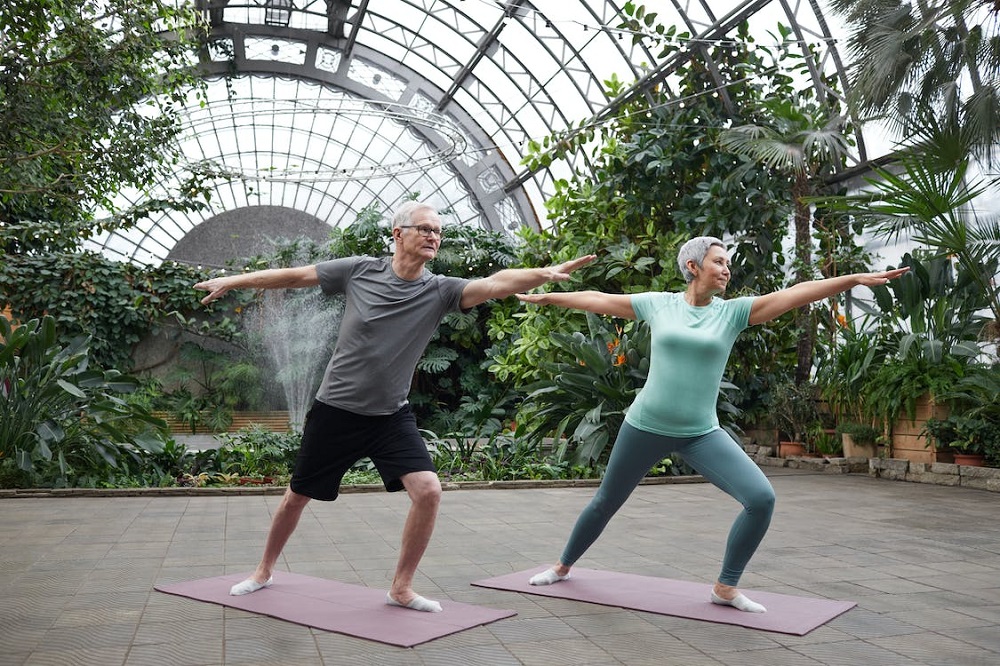Aging Well Guides, Signs, & Healthy Habits to Age Gracefully

Aging is a natural part of life, and how we age can greatly impact our quality of life in our later years. It’s a journey that everyone embarks on, and the choices we make along the way have a profound influence on our overall well-being. The process of aging well involves taking a proactive approach to maintaining your physical, mental, and emotional health. In this article, we’ll delve deeper into the multifaceted facets of aging well and provide valuable tips on how to make the most of your golden years.
As we age, we accumulate experiences and knowledge that shape us into wiser individuals. Aging well is about celebrating this wisdom and using it to lead a life filled with joy and contentment. It’s an opportunity to reflect on the lessons learned, appreciate the beauty in everyday moments, and share your knowledge with those around you.
Throughout this article, we’ll explore the importance of staying physically active, maintaining a nutritious diet, and nurturing positive relationships. We’ll delve into the significance of a positive mindset and how intellectual stimulation can keep your mind sharp. Managing stress and finding purpose in your life will also be discussed, as they are integral to aging gracefully and happily.
What is Aging Well?
Aging well is the art of growing older while maintaining good health, vitality, and a high quality of life. It’s about embracing the aging process with grace and vitality, rather than seeing it as a period of decline.
This approach to aging encourages individuals to view their later years as a time of opportunity and continued growth, where life’s experiences and wisdom are cherished, and new adventures are eagerly welcomed.
Why Is Aging Well Important?
Aging well is crucial for several reasons. It allows you to enjoy a fulfilling and active life as you age. It’s an opportunity to savor the fruits of your life’s work, explore new interests, and spend time with loved ones. It also reduces the risk of age-related diseases, such as heart disease, diabetes, and cognitive decline, thereby increasing your chances of a longer, healthier life.
Aging well sets a positive example for younger generations, showing them that getting older doesn’t mean giving up on life. By demonstrating that age can be a time of vitality, wisdom, and contribution, you inspire the generations to come to embrace their own aging journey with optimism and enthusiasm. This intergenerational exchange of values and experiences enriches our society and strengthens the bonds between family members, creating a legacy of health and well-being.
Staying Active
Maintaining physical activity is a cornerstone of aging well. Regular exercise can help you stay fit, flexible, and strong. It also reduces the risk of chronic illnesses and promotes a sense of well-being.
Exercise stimulates the release of endorphins, those feel-good hormones that can boost your mood and reduce feelings of anxiety or depression. This is particularly important as we age because it can help combat the natural stresses and challenges that life presents.
Staying physically active isn’t just about hitting the gym or running marathons. It can be as simple as taking a brisk walk in the park, dancing to your favorite music, or practicing yoga to enhance flexibility. The key is finding an activity you enjoy, as this not only makes it easier to maintain but also adds a sense of fulfillment to your daily routine.
Regular exercise significantly reduces the risk of chronic illnesses, such as heart disease, osteoporosis, and diabetes. It helps maintain a healthy weight, lowers blood pressure, and improves blood circulation, all of which are critical for your long-term health.
Eating a Balanced Diet
A nutritious diet is essential for aging well. Consuming a variety of fruits, vegetables, whole grains, and lean proteins ensures that you get the necessary nutrients to support your health as you age.
Fruits and vegetables provide essential vitamins and antioxidants that help protect your cells from damage and support a robust immune system. Whole grains offer sustained energy and fiber to maintain digestive health. Lean proteins are crucial for preserving muscle mass and strength, which can help you stay active and independent as you age.
A well-balanced diet plays a vital role in weight management. Maintaining a healthy weight reduces the risk of chronic conditions like diabetes and arthritis. It also alleviates stress on your joints, making it easier to stay physically active. By fueling your body with the right nutrients, you’re not only enhancing your overall health but also ensuring that you have the energy and vitality to fully enjoy your golden years.
Regular Health Checkups
Frequent health checkups can catch potential health issues early and enable timely intervention. It’s essential to stay on top of preventive care and screenings. Regular visits to your healthcare provider not only offer the reassurance of good health but also serve as a proactive approach to identifying and addressing any health concerns before they escalate.
During these checkups, your healthcare team can assess your vital signs, conduct various tests, and monitor changes in your health over time. This vigilance helps in the early detection of conditions like high blood pressure, high cholesterol, or even certain cancers. When issues are identified at an early stage, treatment options are often more effective and less invasive, leading to better health outcomes and a higher quality of life.
Preventive care and screenings, such as mammograms, colonoscopies, and vaccinations, are essential components of aging well. These measures protect you from a range of preventable diseases and ensure you remain in the best possible health throughout your golden years. By actively participating in these preventive measures, you take a significant step towards securing a healthier and more vibrant future for yourself.
The Power of a Positive Mindset
A positive mindset can significantly impact your aging experience. Cultivating optimism and resilience can help you adapt to life’s changes more gracefully. When you maintain a positive outlook, you not only navigate the challenges of aging more smoothly but also find joy in the journey.
Optimism fosters a sense of hope and purpose, which can be particularly valuable during life transitions. It allows you to view aging as an opportunity for self-discovery, personal growth, and the pursuit of unfulfilled dreams. With a resilient mindset, you become better equipped to face the inevitable ups and downs that come with aging, such as health concerns or the loss of loved ones.
Your attitude can also have a profound impact on your physical health. Studies show that individuals with a positive outlook tend to have lower stress levels, improved immune function, and even a longer life expectancy. So, by embracing a positive mindset, you not only enrich your own life but also inspire those around you to approach their aging journey with a similar spirit of optimism and resilience.
Engaging in Intellectual Activities
Mental stimulation is vital for cognitive health, as it helps keep your mind sharp and agile. Engaging in activities like reading, puzzles, and learning new skills not only challenges your brain but also expands your horizons.
Reading opens doors to new worlds and ideas, fostering creativity and critical thinking. Dive into books that pique your interests, from fiction to non-fiction, and let your imagination soar.
Puzzles, such as crosswords, Sudoku, and brain teasers, offer delightful mental workouts. They enhance problem-solving skills and memory while providing a sense of accomplishment.
Learning new skills, whether it’s a new language, a musical instrument, or a craft, keeps your mind adaptable and engaged. It encourages neural plasticity, which is the brain’s ability to rewire and adapt, promoting cognitive vitality.
Maintaining Relationships
Staying connected with friends and family is essential for aging well. These relationships are the pillars of emotional well-being as they provide a source of companionship, understanding, and support throughout life’s various stages. In your golden years, the value of these connections becomes even more pronounced.
Social connections not only offer a sense of belonging but also act as a buffer against the feelings of loneliness that can sometimes accompany aging. When you engage in regular interactions with loved ones, you not only share joy and laughter but also have a network to lean on during challenging times. These bonds provide a strong foundation for emotional resilience, helping you weather life’s storms with greater ease.
Social connections can lead to a sense of purpose and fulfillment. By sharing experiences, memories, and stories with friends and family, you contribute to the collective tapestry of your relationships, creating a legacy that can be cherished by future generations. The bonds you nurture can be a source of enduring happiness and meaning in your life, making the journey of aging more enriching and fulfilling.
Building New Social Networks
It’s never too late to make new friends. The beauty of life is that there’s always room for new connections and meaningful relationships, regardless of age. Whether you’re a longtime enthusiast of a particular hobby or you’re curious about exploring new interests, there are clubs or groups waiting to welcome you with open arms.
Joining such clubs or groups not only offers the opportunity to forge new friendships but also provides a sense of belonging and shared purpose. Whether it’s a book club, a gardening group, or a local charity organization, you’ll find kindred spirits who share your interests and passions.
These connections can be a source of joy, support, and social engagement, adding vitality and a sense of community to your life as you age. The camaraderie and shared experiences in these groups can lead to lasting friendships, enriching your journey of aging well.
Managing Stress
Stress management techniques like meditation, yoga, or deep breathing exercises can help you maintain emotional well-being. These practices are invaluable tools for navigating the inevitable challenges that life presents, especially as you age. When you incorporate these mindfulness techniques into your daily routine, you equip yourself with the ability to cope with stress, anxiety, and the pressures of daily life.
Meditation, for example, enables you to find inner peace, reduce the mental clutter that accumulates over the years, and stay centered. By dedicating time to quiet reflection, you can gain a better understanding of your thoughts and emotions, ultimately leading to a more balanced and resilient emotional state.
Yoga not only enhances physical flexibility but also nurtures mental and emotional flexibility. The gentle stretching and controlled breathing in yoga can alleviate tension, improve your mood, and enhance your overall sense of well-being. The sense of community often found in yoga classes can provide valuable social connections.
Deep breathing exercises, on the other hand, offer a quick and effective way to manage stress in any situation. By focusing on your breath, you can immediately reduce the physiological responses to stress, such as increased heart rate and muscle tension. This promotes a sense of calm and emotional stability, helping you better navigate the ups and downs that life throws your way.
Finding Purpose and Fulfillment
Discovering new hobbies, volunteering, or pursuing lifelong dreams can give you a sense of purpose and fulfillment. These activities breathe new life into your years and provide a profound sense of meaning.
Engaging in hobbies allows you to explore interests you might not have had time for earlier in life. Whether it’s painting, gardening, or playing a musical instrument, these pursuits offer both a creative outlet and a delightful sense of achievement.
Volunteering is another remarkable way to experience fulfillment. Contributing your time and skills to causes you’re passionate about not only helps others but also fosters a deep sense of purpose. The knowledge that you’re making a positive impact on your community or the world can be incredibly rewarding.
Pursuing lifelong dreams may be the most gratifying of all. Whether it’s traveling to exotic destinations, writing that novel you’ve always dreamed of, or starting a business, these aspirations give you a reason to wake up each morning with enthusiasm. They provide a roadmap for your future and can lead to a legacy that inspires those who come after you.
Getting Adequate Sleep
Adequate sleep is crucial for physical and mental health. Ensure you get enough rest to recharge your body and mind. Sleep plays a fundamental role in maintaining the body’s overall health. During restorative slumber, the body repairs and regenerates tissues, supports the immune system, and balances hormones. This process not only strengthens your physical health but also enhances your emotional well-being.
Getting a good night’s sleep helps you wake up refreshed, ready to face the day with a clear mind and positive outlook. It aids in memory consolidation, problem-solving, and decision-making, all of which are essential for mental health and cognitive function. Sleep is like a reset button for your brain, allowing you to approach challenges with renewed energy and creativity.
Fdequate sleep is a powerful stress management tool. When you’re well-rested, you’re better equipped to cope with life’s pressures and emotional challenges. You’re less likely to be irritable or anxious, and you’ll find it easier to maintain a positive mindset. In essence, sleep is the cornerstone of your physical and mental well-being, so prioritize it as a key component of your strategy for aging well.
Limiting Harmful Behaviors
Avoiding excessive alcohol consumption, smoking, and other harmful habits that can accelerate aging and harm your health is paramount for aging well. Excessive alcohol intake not only takes a toll on your liver but can also contribute to cognitive decline and frailty in older age. Smoking, with its multitude of health risks, is a surefire way to hasten the aging process, causing premature wrinkles, lung problems, and increased vulnerability to various diseases.
But it’s not just about what you avoid; it’s also about the positive choices you make. Opt for a lifestyle that prioritizes nutritious food, regular exercise, and proper hydration. These choices will keep your body resilient and capable of tackling the challenges that aging can bring.
By adopting these healthy practices, you can add years to your life, ensuring you have more time to enjoy the things that truly matter. You’ll not only look and feel better as you age but also increase your chances of maintaining your independence and vitality in your golden years. It’s an investment in your future self that pays remarkable dividends.
Conclusion
Aging well is a journey that requires a holistic approach to physical, mental, and emotional well-being. By staying active, nurturing positive relationships, and adopting healthy habits, you can make the most of your golden years. Embrace the process of aging as an opportunity for personal growth and continued vitality.
Frequently Asked Questions (FAQs)
- What is the key to aging well?
- The key to aging well is maintaining a healthy lifestyle, staying socially engaged, and nurturing a positive mindset.
- How can I stay physically active as I age?
- You can stay active by engaging in regular exercise, such as walking, swimming, or yoga.
- What are the benefits of a balanced diet for aging well?
- A balanced diet provides essential nutrients, helps maintain a healthy weight, and reduces the risk of chronic diseases.
- How can I combat loneliness in my later years?
- You can combat loneliness by staying connected with friends and family and by actively seeking new social connections.
- Why is managing stress important for aging well?
- Managing stress is crucial because chronic stress can lead to various health issues, both physical and emotional.








